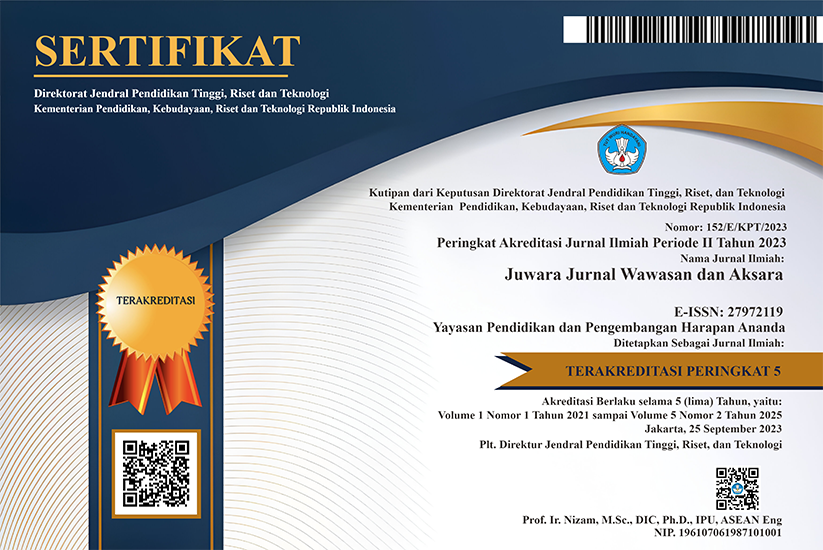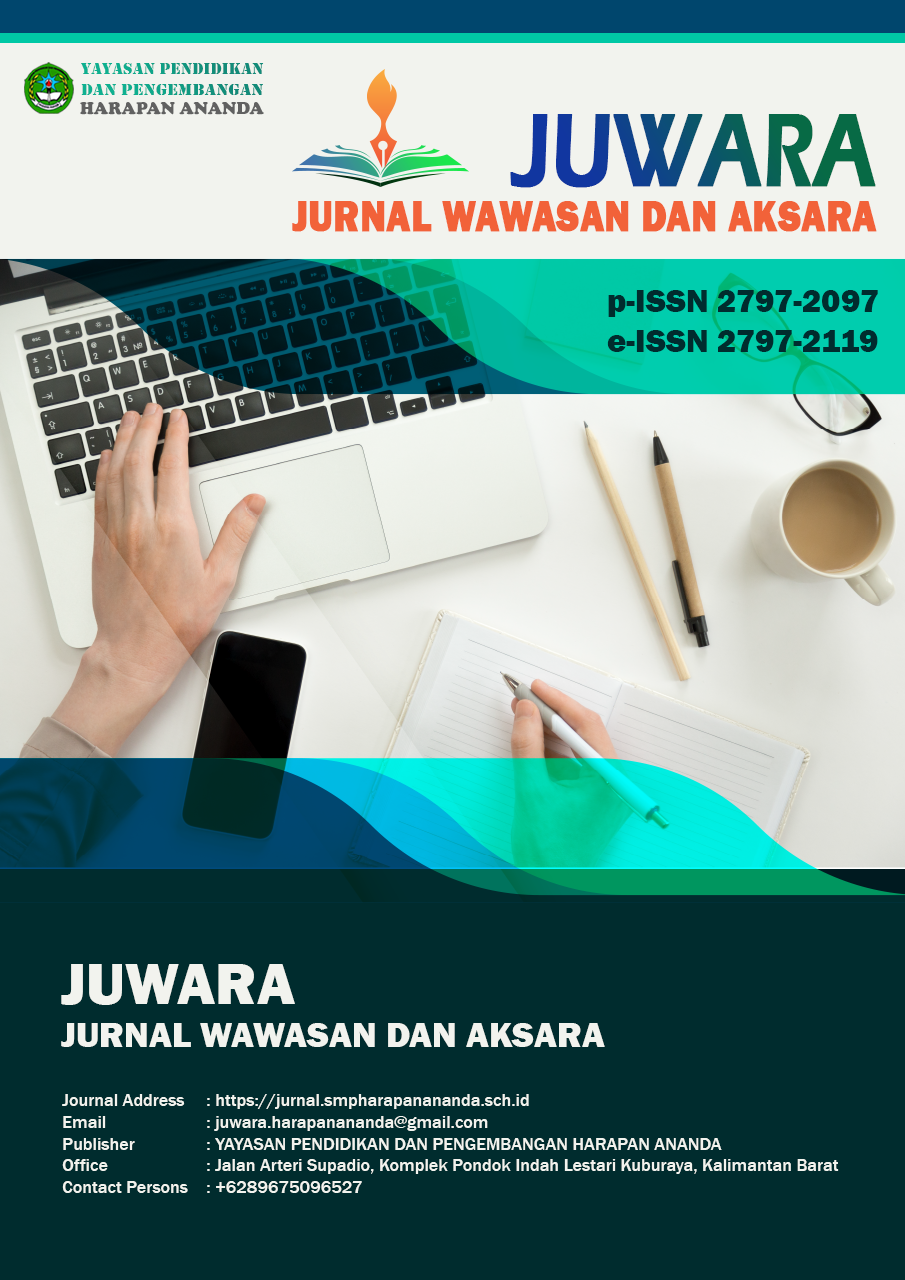Strategies to Minimize Negative Effects of AI Applications for Independent English Learning Situation
DOI:
https://doi.org/10.58740/juwara.v5i1.453Keywords:
artificial intelligence, english learning, negative effectsAbstract
Applications based on artificial intelligence are becoming widely used in education as well. These applications are utilized by both students and professors. Artificial intelligence-based applications that are available for free and indefinite use raise worries about the possibility of abuse. This study aimed to minimize the negative impacts of using artificial intelligence (AI)-based applications on independent English learning activities. The research method used was a descriptive qualitative approach, with data collection techniques through semi-structured interviews with 15 lecturers and open questionnaires with 169 students from four educational institutions in Palangkaraya City. The results of the study showed that 93% of students and 87% of lecturers stated that the use of AI applications has the potential to trigger violations of academic ethics, especially plagiarism and copyright infringement, if users are not prepared with critical awareness. The key findings of this study underlined the importance of strengthening ethical-based digital literacy through three main efforts, they are1) socialization of guidelines for the use of AI in accordance with academic principles, 2) integration of technology ethics modules in the learning curriculum, and 3) development of a collaborative-based supervision system between institutions, lecturers, and students.
References
Adha Zam Zam Hariro, Harahap, N. R., Puspitasari, P., Ardiyani, F., Melisa, W., & Juliani, J. (2024). Mengatasi kesenjangan digital dalam pendidikan: Sosial dan best practices. Jurnal Nakula: Pusat Ilmu Pendidikan, Bahasa dan Ilmu Sosial, 2(4), 187–193. https://doi.org/10.61132/nakula.v2i4.954
Apriliani, D. (2024). Penggunaan artificial intelligence dalam pembelajaran bahasa Indonesia. DIKBASTRA: Jurnal Pendidikan Bahasa dan Sastra, 7(1). https://doi.org/10.22437/dikbastra.v7i1.33262
B, I., Thamrin, A. N., & Milani, A. (2024). Implementasi etika penggunaan kecerdasan buatan (AI) dalam sistem pendidikan dan analisis pembelajaran di Indonesia. Digital Transformation Technology, 4(1), 714–723. https://doi.org/10.47709/digitech.v4i1.4512
Barr, A., Cohen, P. R., & Feigenbaum, E. A. (2023). The handbook of artificial intelligence. Amazon.
Firdaus, M. R., Irawan, R. R., Mahardika, C. H. Y., Gaol, P. L., & Prinaryanto, B. A. (2024). Tantangan teknologi artificial intelligence pada kegiatan pembelajaran mahasiswa. IJEDR: Indonesian Journal of Education and Development Research, 2(1), 379–384. https://doi.org/10.57235/ijedr.v2i1.1781
Gunawan, G., Harjono, A., Nisyah, M., Kusdiastuti, M., & Herayanti, L. (2020). Improving students’ problem-solving skills using inquiry learning model combined with advance organizer. International Journal of Instruction, 13(4), 427–442. https://doi.org/10.29333/iji.2020.13427a
Handoko, R. M. H., Putra, R. D., Pratama, N. N. K., & Pranatawijaya, V. H. (2024). Implementasi Gemini AI dalam pengembangan aplikasi e-commerce mobile generate deskripsi produk. ProTekInfo (Pengembangan Riset dan Observasi Teknik Informatika), 11(1), 21–25. https://doi.org/10.30656/protekinfo.v11i1.8595
Hartono, H. (2024). A study on higher education policy makers’ perceptions towards the use of AI in English language learning. In E. M. Dukut, A. Suratno, H. Hartono, R. Gajjala, M. M. Jayanthi, C. D. Gabriel, & H. P. Atilano (Eds.), Proceedings of the 7th Celt International Conference (CIC 2024) (Vol. 897, pp. 201–211). Atlantis Press SARL. https://doi.org/10.2991/978-2-38476-348-1_15
Jaakkola, H., Henno, J., Lahti, A., Jarvinen, J.-P., & Makela, J. (2020). Artificial intelligence and education. 2020 43rd International Convention on Information, Communication and Electronic Technology (MIPRO), 548–555. https://doi.org/10.23919/MIPRO48935.2020.9245329
Kusumadewi, S. (2023). Artificial intelligence (teknik dan aplikasinya). Graha Ilmu.
Mulyono, Y., Suranto, S., Yamtinah, S., & Sarwanto, S. (2023). Development of critical and creative thinking skills instruments based on environmental socio-scientific issues. International Journal of Instruction, 16(3), 691–710. https://doi.org/10.29333/iji.2023.16337a
Nur Fitria, T. (2023). The use of artificial intelligence in education (AIED): Can AI replace the teacher’s role? EPIGRAM (e-Journal), 20(2), 165–187. https://doi.org/10.32722/epi.v20i2.5711
Oktavian, R., Aldya, R. F., & Arifendi, R. F. (2024). Artificial intelligence dan pendidikan era Society 5.0. Inteligensi: Jurnal Ilmu Pendidikan, 6(2), 143–150. https://doi.org/10.33366/ilg.v6i2.5798
Rich, E., Knight, K., & Nair, S. B. (2021). Artificial intelligence. Amazon.
Rohmiyati, Y. (2025). Enhancing English language learning through artificial intelligence: Opportunities, challenges and the future. DIAJAR: Jurnal Pendidikan dan Pembelajaran, 4(1), 8–16. https://doi.org/10.54259/diajar.v4i1.3344
Saad, S., Al-Ajmy, & Al-Mutairi, M. (2024). The impact and future of student's independent learning. MECCA Journal of Middle European Construction and Design of Cars, 68.
Setiawi, A. P., Patty, E. N. S., & Making, S. R. M. (2024). Dampak artificial intelligence dalam pembelajaran sekolah menengah atas. Indo-MathEdu Intellectuals Journal, 5(1), 680–684. https://doi.org/10.54373/imeij.v5i1.826
Sugiyono. (2020). Metode penelitian kuantitatif, kualitatif, dan R&D: Edisi kedua, cetakan ke-2. Penerbit Alfabeta.
Suharmawan, W. (2023). Pemanfaatan Chat GPT dalam dunia pendidikan. Education Journal: Journal Educational Research and Development, 7(2), 158–166. https://doi.org/10.31537/ej.v7i2.1248
Syalwa, J., Mzuhaffar, M. H., & Fadillah, A. (2024). The impact of the use of technology on social interaction in communication science department students semester VI State Islamic University of North Sumatera. OPINI: Journal of Communication and Social Science, 1(2), 27–33. https://doi.org/10.70489/opini.v1i2.323
Downloads
Published
How to Cite
Issue
Section
License
Copyright (c) 2025 Norhayati, Sulistyowati, Sherly Jayanti

This work is licensed under a Creative Commons Attribution-NonCommercial 4.0 International License.
JUWARA: Jurnal Wawasan dan Aksara provides open access to anyone so that the information and findings in these articles are useful for everyone. This journal's article content can be accessed and downloaded for free, following the creative commons license used.




















